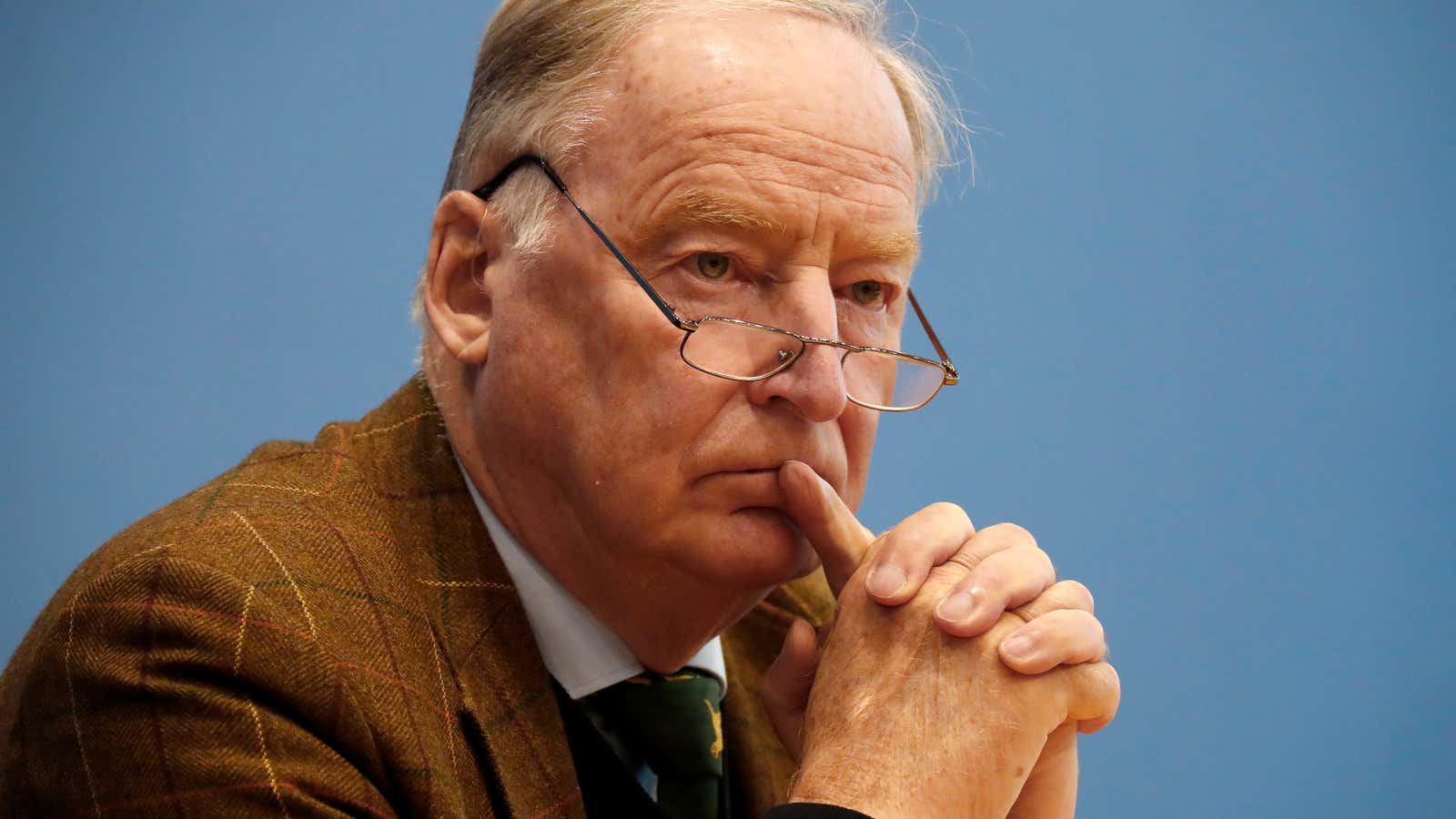Alexander Gauland, co-founder of far-right party Alternative for Germany (AfD), has preached one message since 2015: Migrants, especially those of the Islam faith, are a threat to Germany, and the country should close its borders and kick them out.
Clad in his signature tweed blazer and woolen sweater, Gauland repeated his mantras at a meeting with foreign correspondents in Berlin this week, saying that Islam has no place in Germany, and chancellor Angela Merkel should never have opened the borders to refugees in 2015. If she had shut the borders, he said, the refugees would have been forced to go back to where they came from.
But he wasn’t always like this. A letter unearthed recently by the Frankfurter Rundschau (link in German) showed a very different Gauland, one who believed strongly that Germany should have a welcoming refugee policy.
Nearly three decades ago, when Germany was taking in refugees from the Balkans, Gauland was the boss of the Märkische Zeitung newspaper. He banded together with other politicans in 1993 to sign a letter demanding Germany implement a “humane asylum policy” based on a “societal commitment to generosity.” The letter also demanded that Germany amend its citizenship laws to reflect a “multicultural” and “tolerant” society.
The 77-year-old has, so far, made no comment on why his 52-year-old self felt so differently.
This letter is not the only piece of evidence that has shown a complete about-face turn on the migrant issue. In 1979, when he worked as office manager for Frankfurt mayor Walter Wallmann, he went on a mission to Hong Kong to negotiate bringing a large group of Vietnamese refugees back (link in Germany) to Germany—the trip was a huge success.
A disappointed Christian Democrat
Gauland has not explained why he made a 180-degree turn from a migration liberal to a xenophobic politician over the space of a few decades. What is clear, however, is that he went from being a loyal member of the Christian Democratic Union for over 40 years to being a bitter critic of the party, which he has slammed as “a vehicle for Merkel’s political career.”
His resentment of the CDU party leader is no secret: he has branded Merkel a “dictator” and a “lawbreaker.” When the AfD entered the German parliament for the first time in September with 13% of the vote—the first time a right-wing party had done so since World War 2—Gauland vowed the AfD would “hunt” Merkel and “take back our country and our people.”
He’s not alone in resenting the chancellor for her welcoming refugee policy. In the September general election, the CDU bled over a million voters to the AfD. An Infratest Dimap poll after the election found that half of those who voted for the party said the AfD “understood better than the other parties how people feel.”
Culture under threat
In response to Quartz’s question about whether he believed German culture was so weak that it actually required protecting from outside influences, Gauland said that “the German culture has never been weak.” He said the problem was that Islam’s concept of state and society was not compatible with Germany’s concept of free democracy.
“The problem is not a cultural problem, we never said that.” Gauland added. This appears to contradict what he told The Atlantic in October, when he noted that refugees were endangering the “German way of life.”
“There are German traditions, there are German foods, there is German history. There is a German way of life,” he said. In response to a question about whether that way of life could survive if Germany continued to welcome immigrants, Gauland stated: “No, it can’t.“
